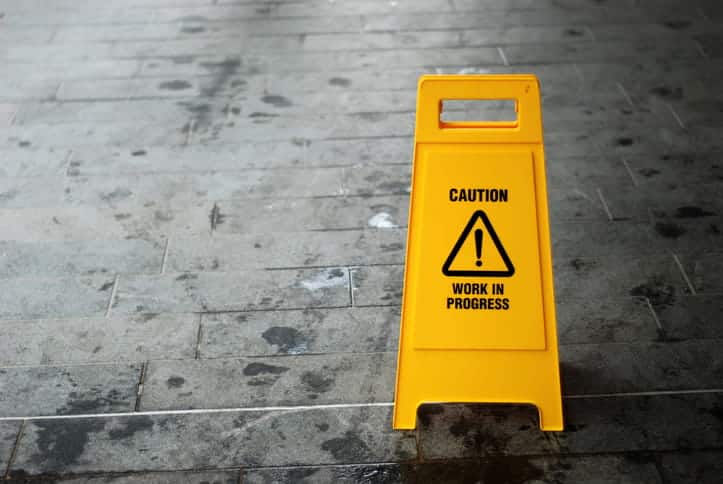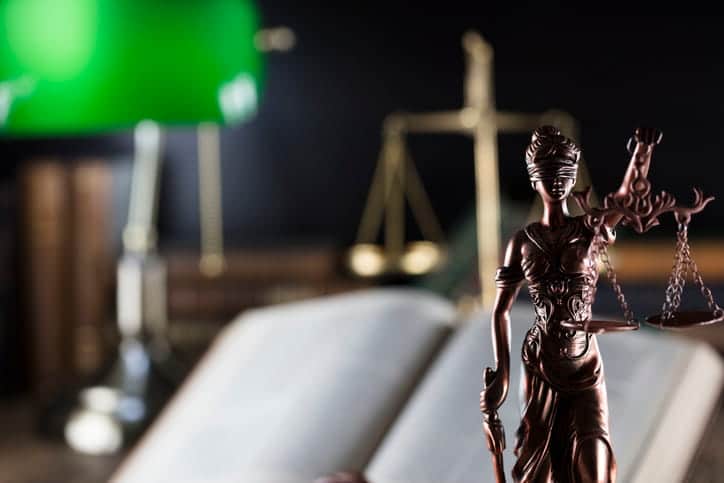How Long Do Slip-and-Fall Settlements Take?
Falls are serious accidents capable of causing catastrophic injuries and are among the leading causes of accidental deaths, claiming 44,686 lives in 2021. Injuries from falls send millions of elderly Americans to emergency rooms for medical care each year, and slips, trips, and falls are among the top three workplace injuries requiring emergency medical care. In 2020, 18% of the nonfatal workplace injuries that required the injured persons to take time off work to recover stemmed from slips, trips, and falls.

Legally, slip-and-fall encompasses the following accidents:
- Slip-and-fall: These accidents involve falling after slipping on something, such as a wet floor or ice
- Step-and-fall: Changes in floor or ground height are a common cause of step-and-fall accidents
- Stump-and-fall: Objects like stairs can cause you to lose your balance and suffer a stump-and-fall accident
- Trip-and-fall: Objects on the floor or ground are trip hazards that can cause trip-and-fall accidents
Since any slip-and-fall accident can cause life-altering injuries or interfere with your ability to work, you may wonder about your legal options after your accident, whether you have grounds to seek damages, and how long slip-and-fall settlements take. Understanding the timelines for a slip-and-fall settlement and factors affecting slip-and-fall claims can prepare you for what to expect from a slip-and-fall case.
Were you injured in a slip-and-fall accident? Contact Jack Bernstein, Injury Attorneys now.
On Average, a Slip-and-Fall Settlement Takes 9 – 12 Months
Resolving legal claims in weeks or even a few months is rare. Most settlement claims take closer to a year to resolve, and some may take much longer.
Although facing a lengthy legal process to secure damages for your fall injury may be discouraging, it can be to your advantage. Taking time to settle ensures you have as much medical information as possible and understand your long-term prognosis. Medical tests can confirm your injuries. Your medical team may try various treatments that don’t work, verifying you need surgery or other long-term, costly treatment. Having time to ensure you understand your injuries and how they’ll impact your life ensures you don’t settle for less compensation than you deserve.
Factors That Influence the Timeframe for a Slip-and-Fall Settlement
Multiple factors affect slip-and-fall settlement timelines:
Severity of Injuries
It may take longer to resolve your claim if severe injuries interfere with your ability to address your legal rights. Florida requires slip-and-fall injury victims to file a legal claim within two years of their injury unless they’re under 18 or their injuries prevent them from taking action. Suppose a slip-and-fall victim was in a coma because of their injuries. In that case, there would be grounds to extend the filing deadline.
Time to Gather Evidence
The time needed to investigate the accident affects the settlement timeline. Your legal team will look for evidence and review available evidence while building your case. Information from their investigation helps confirm who was at fault and whether comparative fault is a factor that could impact your claim.
The volume of evidence determines how long it takes to investigate. Photos, video footage, and eyewitness accounts are all relevant when preparing a legal claim. Suppose your slip-and-fall injury occurred in a grocery store or restaurant. There could be dozens of witnesses your legal team needs to interview during their investigation.
Also, your slip-and-fall attorney can subpoena records that could be relevant to your claim. Suppose you park in a paid parking lot beside your workplace. When you leave work one day, you step into a hole in the parking lot, lose your balance, and fall.
Maintenance records could establish that the parking lot management knew about the hole but failed to warn people about the safety hazard. These records establish their breach of duty to ensure people on their property are safe.
Your attorney must file subpoena requests with the court and wait for the court to issue the subpoena. The recipient may take legal steps to challenge the order, prolonging how long it takes for your lawyer to receive the documentation they seek.
Since many variables are at play during an investigation, some accident investigations take several months or over a year to complete.
Multiple Defendants
Some accidents involve multiple at-fault parties. Suppose a property owner hires a contractor to repair an uneven floor and reduce the risk of step-and-fall accidents. The contractor’s team comes to the property, works on the floor, and tells the owner what they’ve done. The owner thanks them, and the contractor bills the owner and leaves.
You visit the property a few days later. You walk across the floor, lose your balance, and fall. Upon investigation, the property owner realizes the contractor didn’t complete the repairs. Who’s liable?
The property owner would argue that the contractor is liable because they were hired to perform a task they didn’t complete. However, the contractor could argue that they informed the owner about their work, the owner did not inspect their work, and the incident occurred several days later. The contractor could argue it was a new issue, making the property owner liable.
Work records may support the argument that both parties share liability. The records could confirm that the contractor’s team didn’t take all the steps required to address the floor’s height differences. The property owner’s failure to inspect the work could also be grounds to establish their liability.
In addition to the time needed to confirm both parties share liability, it may take longer to resolve your settlement while the at-fault parties dispute their liability. Each party will pay damages according to their percentage of blame. This factor may motivate them to argue with the other party to reduce the compensation they must pay.
Liability Disputes
Suppose your slip-and-fall accident occurred in a commercial building, such as a gas station or grocery store. The business owners rent the property, and the terms of their lease may determine who’s liable for your injuries.
Suppose the property owner is responsible for all building maintenance and failed to eliminate the trip hazard that caused your fall. It may seem that you have a straightforward premises liability claim against the property owner.
However, the lease states tenants are responsible for maintenance if they fail to notify property owners about issues. The property owner disputes their liability because they claim the tenants failed to inform them about the trip hazard.
Your legal team must prove liability to establish whose negligence caused your accident. The dispute between parties could prolong the time needed to establish who to file your claim against, increasing the time needed to settle.
Pre-Existing Medical Conditions
Pre-existing medical conditions can complicate injury claims. Liable parties may subpoena medical records and interview medical experts in an attempt to argue that some or all of your injuries stem from your pre-existing condition. Blaming your pre-existing condition can be justification for claiming they aren’t liable for all medical bills because your slip-and-fall accident isn’t solely responsible for the severity of your condition.
Negotiating With the Insurance Company
Negotiating with insurance companies can be challenging. Insurance companies sometimes push for quick settlements to avoid bad publicity. Often, they seek smaller settlements than accident victims deserve and include confidentiality clauses in the settlements, preventing victims from discussing their accidents.
Negotiating with the insurance company can take longer if they don’t agree to a fair settlement offer. It can also take longer if they dispute their client’s liability for your injuries.
The Slip-and-Fall Lawsuit Process
Consulting an attorney is the first step in filing a slip-and-fall claim. Once you hire an attorney, they’ll complete the following steps:
- Investigation: Injury investigations involve seeking evidence, interviewing witnesses, consulting medical professionals, issuing subpoenas, and taking other necessary steps to ensure your legal team has all the relevant information about your accident
- Demand letter: Lawyers issue demand letters to at-fault parties. This letter explains the basis for your claim. It allows the at-fault party to resolve the claim through negotiation.
- Negotiation: Negotiations can occur once the at-fault party responds to your demand letter. Your attorney will use information gathered during their investigation to support your compensation claim. The defendant’s insurance company and attorney will attempt to present evidence to reduce their liability.
- Settlement or trial preparations: Successful negotiations lead to an acceptable settlement offer. Once the legal paperwork is complete, you’ll receive compensation. However, your attorney will continue preparing for your trial if you cannot agree on a settlement. Your attorney will present evidence to establish the grounds for your claim and argue for you to receive a judgment from the defendant.
What Damages Can I Sue for After a Slip-and-Fall?
Injury victims have grounds to claim economic and non-economic damages for their injuries. Some may also seek punitive damages if the grounds for their claim support an argument of gross negligence or intentional reckless conduct causing harm.
Economic Damages
Economic damages are injury costs incurred by victims. Grounds for economic damages vary based on your circumstances. Suppose you work full-time, care for your minor children, and care for an elderly parent. You could have claims for lost wages, childcare, and home care for your parent if you’re unable to look after them because of your injuries. However, you may not have childcare or home care aid bills if you’re single and not caring for an older family member.
Reasons for economic damages include the following:
- Burial costs
- Childcare bills
- Funeral expenses
- Home care aid bills
- House cleaning bills
- Job retraining costs
- Lost wages
- Medical bills
- Property damage
- Transportation costs
Non-Economic Damages
Non-economic damages cover the way your accident injuries affect you personally. Claims for non-economic damages could stem from any of the following:
- Anxiety
- Depression
- Grief
- Loss of enjoyment of life
- Loss of intimacy
- Pain and suffering
- Phobias
- Post-traumatic stress disorder
Punitive Damages
Punitive damages only apply when the at-fault party is guilty of gross negligence or deliberate actions they knew were likely to cause harm. Suppose someone thought it would be funny to video people having slip-and-fall accidents. They poured water on the floor and didn’t put up signs warning people about the potential hazard. They videoed people falling and posted the videos online. In that case, your attorney could argue their intentional, reckless actions are grounds for punitive damages.
A Skilled Slip-and-Fall Attorney Will Help You Get the Most for Your Claim While Expediting the Process
You need evidence to win your slip-and-fall case. Experienced slip-and-fall attorneys know how to find evidence, prepare your case, and justify the compensation you seek. Your attorney will ensure you consider all relevant factors when calculating damages so you can receive the maximum compensation available.
If You Have Been Injured in a Slip-and-Fall Accident, Give Bernstein Injury Attorneys a Call

Our attorneys are here to provide the legal support you need after your Tampa slip-and-fall accident. Our team will listen to you and use the information you provide to launch a thorough investigation, ensuring we identify all parties responsible for your injuries. We’ll handle the legal matters while you seek medical care. We don’t charge upfront fees, so you don’t have to worry about money when you call us, and we only take a percentage of your settlement when we win your case.
Turn to the experts at Jack Bernstein, Injury Attorneys, and get your free legal consultation regarding your slip-and-fall accident injury.
Sources:
Accidents or Unintentional Injuries. (2023).
Facts About Falls. (2023).
The 2023 Florida Statutes (including Special Session C): 768.81. (2024).
Traumatic Occupational Injuries. (2022).
